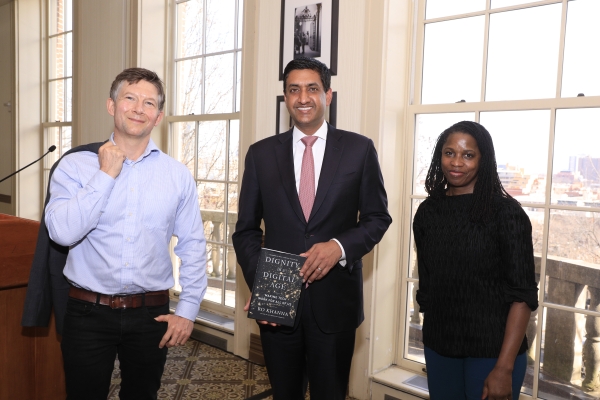Rep. Ro Khanna of California Addresses, ‘How Can We Repair Our Democracy?’
The author of Dignity in a Digital Age discussed patriotism, the fraying social fabric, the digital future, and the fate of American democracy with Columbia Law Professors Olatunde Johnson and Jedediah Purdy.
Rep. Ro Khanna, D-Calif., whose congressional district includes Silicon Valley, spoke at a lunchtime event for Columbia Law School students at Faculty House on February 3.
The program, “How Can We Repair Our Democracy? A Conversation With Rep. Ro Khanna,” was moderated by Jedediah S. Purdy, William S. Beinecke Professor of Law, and Olatunde C. Johnson, Jerome B. Sherman Professor of Law. Purdy opened the event by posing a series of provocative questions for Khanna: “Is this a good country anymore? Has it ever been a good country? Does it make sense to be hopeful for the country? Does it make sense to think of yourself as patriotic here?”
Khanna, whose new book, Dignity in a Digital Age: Making Tech Work for All of Us (Simon & Schuster, 2022), explores the soul and future of the United States, was forthright in his response: “When I talk about patriotism and a hopefulness for the American experiment, I certainly don’t think it should be blind patriotism or patriotism that erases history or a patriotism that is unreflective.”
As the son of middle-class Indian immigrants who was raised in Philadelphia, Khanna said his “story is one of aspiration, of hope, the possibility of America.” He explained that there is a symbiosis between the Indian independence movement and the U.S. civil rights movement. “My parents wouldn’t have been allowed in this country if it weren’t for the civil rights movement . . . . It was the 1965 immigration reform act that allows basically non-Europeans to come to America,” he said. In 2018, Khanna and John Lewis, the late congressman and civil rights champion, explored this connection as co-authors of a Boston Globe op-ed, “The Intertwined Freedom Movements of Gandhi and Martin Luther King Jr.”
Khanna also believes that Americans should not have to move from the places where they grew up to have a good life and economic security. “One of the central themes of the book,” he said, “is that community matters, place matters. I say this as someone whose family left their place, and I left, of course, Pennsylvania. But I’m aware of the sacrifices or the loss of that. Now there is value . . . to leaving, to ambition, to exploring new things. But it shouldn’t be one of lack of any choice, of communities just saying, ‘Well, we’re going to move.’”
Khanna argues that laissez-faire capitalism alone cannot provide everyone with a pathway to the American dream. “There has to be an intentionality of getting every community, every person, an opportunity to participate in the modern economy and contribute to the modern economy,” he said. “We have to also provide the avenues of building wealth, of contributing weath, and that we can do with the digital age.”
When Johnson asked about the role of social media platforms in “promoting disinformation as something that is really threatening to our democracy in various ways,” Khanna answered that there needs to be more regulation, especially in regards to online speech that incites violence. But he also noted the value of social media in movements such as #MeToo and Black Lives Matter. “I have argued that these tech companies ought to be hiring a lot more philosophers and lawyers and ethicists and embracing that they are new media companies and have some responsibility,” he said.
“It’s a very important part of the next 15, 20 years to define what the digital public sphere will look like,” he told the students. “And all of you, depending on what careers you choose, can have a big impact on that because obviously the legal profession will help shape that.”
“How Can We Repair Our Democracy? A Conversation With Rep. Ro Khanna” was co-sponsored by Columbia Law School’s Francis F. and Catherine Randolph Speakers Fund, Center for Constitutional Governance, Constitutional Democracy Initiative, Law and Political Economy Society, and the Knight First Amendment Institute at Columbia University. Watch the event above.
